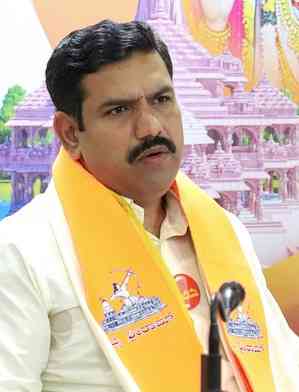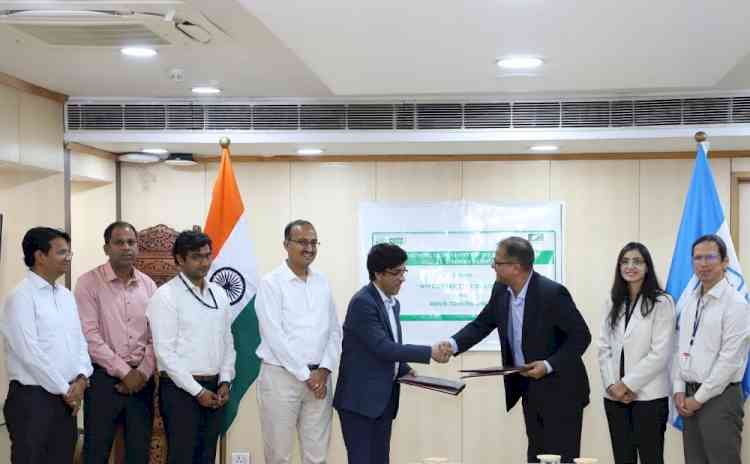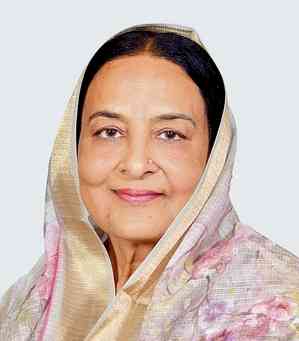Kiran Chaudhry urges Empowered Committee of State Finance Ministers to collectively raise issue of CST
Author(s): SK VyasA related photograph. New Delhi, August 20, 2014: Haryana Excise and Taxation Minister, Kiran Choudhry today urged the Empowered Committee of the State Finance Ministers to collectively raise the issue of CST compensation...


A related photograph.
New Delhi, August 20, 2014: Haryana Excise and Taxation Minister, Kiran Choudhry today urged the Empowered Committee of the State Finance Ministers to collectively raise the issue of CST compensation and request the Central Government to release entire pending CST compensation to the States for the period upto 2013-14 during this financial year.
Choudhry, who was speaking in the meeting of the Empowered Committee of the State Finance Ministers in New Delhi today, deviated from the listed items to take up this vital issue and reminded that many of the States including Haryana had earlier raised this issue in the meeting between Union Finance Minister and Empowered Committee of State Finance Ministers held on July 3, 2014 at New Delhi in which the Union Finance Minister had assured the States that the compensation will be paid. She said that despite this assurance, no provision for payment of CST compensation to the States has been made in the Union Budget for the year 2014-15 presented in the Parliament.
She reiterated that from the year 2014-15 onwards, either the States be compensated fully till the GST is actually rolled out or the CST rate should be increased to four per cent. Prompt action to resolve this issue and releasing the withheld amount of CST compensation will create atmosphere of mutual trust and understanding between the States and Central Government.
While referring to the listed agenda items, she said that in case of exempted list of goods in GST regime, besides common schedule for exempted goods, States might be allowed to include and exclude some additional goods of local importance. For example even though the Empowered Committee (EC) has recommended that food grains should be kept in the exempted list under the VAT regime but due to peculiar circumstances obtaining in food surplus States like Haryana purchase Tax/VAT on the foodgrains and other agricultural products is being levied. Haryana is providing subsidized electricity to the farmers amounting to Rs.4000 crores per year. It is also providing free water for irrigation. Elaborate infrastructure for marketing of agriculture produce has been set up at enormous cost over the last several decades which is responsible for Haryana becoming a food surplus State. If no revenue is now to be generated out of its surplus agricultural production, it will not be possible for the State to sustain this infrastructure. For these reasons, we have to keep a provision for State specific exceptions, she added.
She said that Haryana agrees with the recommendation of the committee that there should be common list of goods attracting concessional rate of tax in GST regime both for the Centre and the State. She said, We agree with the views of the committee that internationally accepted HSN Code should be adopted for classifying the goods under the GST regime. The HSN commodity code needs to be introduced at the same time as and when Goods and Services Tax is implemented”.
She suggested that under the Threshold (Registration and Compounding Scheme), threshold of Rs.25 lakh proposed by the Sub-Committee should be reduced to Rs.10 lakh. The threshold for the SGST and CGST should be common except for North-eastern States, where the threshold could be prescribed at a lower level. The threshold both for services and for goods should be same. It should be worked out taking into account both the supply of goods and services by a dealer. Principally the State agrees to the recommendations of the Committee regarding composition scheme but the State is of the view that the ceiling of gross turn over and floor rate for composition should be Rs.50 lakh and one per cent respectively. She pointed out that the State did not agree with the proposition of non –maintenance of books of accounts in case of dealer opting for composition.
While referring to the problem of dual control on dealers, she said that while the Committee has recommended that “every dealer” will file return to both the Authorities that is to the State Authority as well as to the Central Authority. Requiring every dealer whether he falls within the jurisdiction of Central Government or not is bound to be resisted vehemently by everyone. She suggested that the returns should be filed with the respective Authorities by the dealers who fall within the prescribed turn over limits and not by every dealer.
She said that although the Committee has recommended that all the dealers whose turnover for the goods and service is above Rs. 1.5 crores will be subject to the dual control for scrutiny, audit and enforcement and below that amount, both Central Authorities and State Authorities can do online scrutiny and risk based audit of the returns filed without any dealer contact by the Central Authorities. She added that Haryana is in favour of exclusive power of scrutiny, audit and enforcement by the States for the dealers/service providers whose turnover is below 1.5 crores. It is further suggested that a clear jurisdiction for scrutiny/risk based audit selection/Dispute Resolution has to be worked out. Suitable provision in the SGST, CGST and IGST Acts may be made to give effect to this administrative arrangement, she added.
She said that the State agrees with the recommendations of the Committee that IGST Model be followed to tax inter-state transactions under destination based GST and specific norms for implementation for the IGST Model. She said that the Haryana Government is of the view that the dealer should be allowed to file e-return though he does not pay full tax with the restriction that the purchaser would not be allowed to claim ITC on purchases in case the seller does not pay full tax or pays part payment of tax. Such return would not be considered as valid return for settlement between the Centre and the States. The reason for allowing the seller to file return is that the authority could know his transactions and liability to pay tax. Haryana supports the view of the committee that a uniform practice of payment of tax in every month should be followed. There should not be any exception with respect to payment of tax, she added. She said that although the report suggests that in case of capital goods, claim of Input Tax Credit should be spread over several tax periods, but it will be administratively complicated. Therefore, she suggested that Input Tax Credit on capital goods should be allowed in one go in the tax period itself for which the dealer files the return.
She said that at present a big proportion ranging between 20 to 25 per cent of total sales tax revenue of Haryana comes from the CST proceeds on the inter-state sales. In the IGST model being discussed by the committee tax on supplies of goods and services from the exporting States like Haryana would finally flow to the actual consuming State thereby leaving no tax revenue to it. This would seriously disincentivise a net producing State like Haryana which has provided excellent physical and social Infrastructure for Manufacturing, Services and Agricultural Sectors to flourish in the State. There is serious apprehension among the States on the possibility of suffering revenue losses after the implementation of GST. Huge revenue loss due to abolition of CST would results into higher RNR and dependency of the net-exporting States for GST Compensation from the Centre. Bitter experience of CST Compensation has created a trust deficit among the Centre and the States, she added.
Therefore, she said, Haryana state proposes that the GST Council under the proposed article 279 A must be given a specific mandate to deliberate upon the losses in the State revenue post-GST and it should be mandated to devise ways to fully compensate for these losses. She said that growth rate of VAT and CST upto the month of June, 2014 (2014-15) has been about 11.65 per cent as compared to the same period of the last year. This growth has been lower than our expectations since there is a slowdown in industrial and manufacturing sectors as well as in the real estate sector. This is affecting sales/purchases of goods in a big way.
Apart from Chairman of the Empowered Committee A.R Rather, Ministers from various States and officers of the Government of India, State Governments and Empowered Committee were also present in the meeting.
(SK Vyas/Jalandhar)

 cityairnews
cityairnews 















